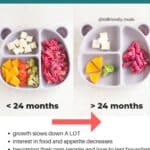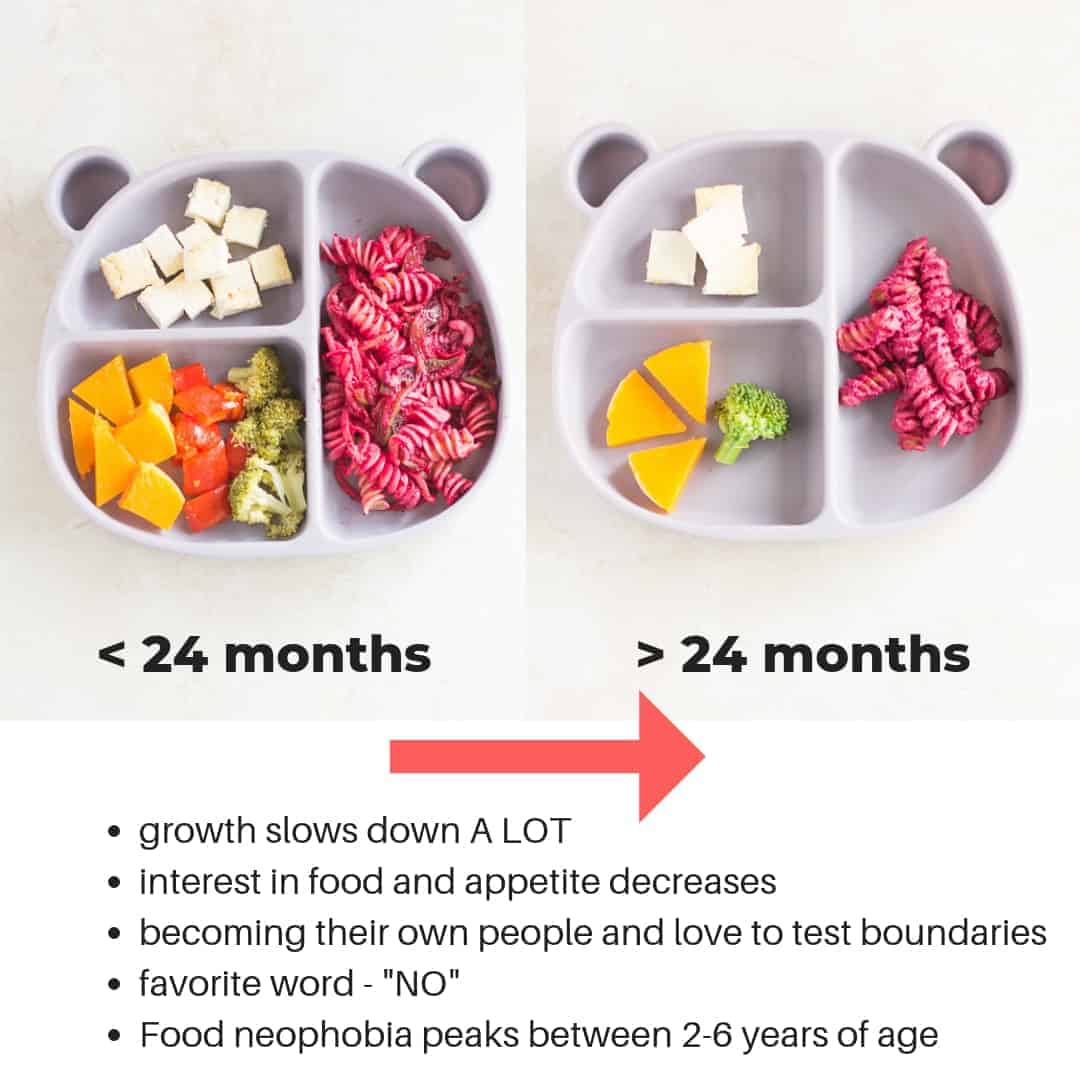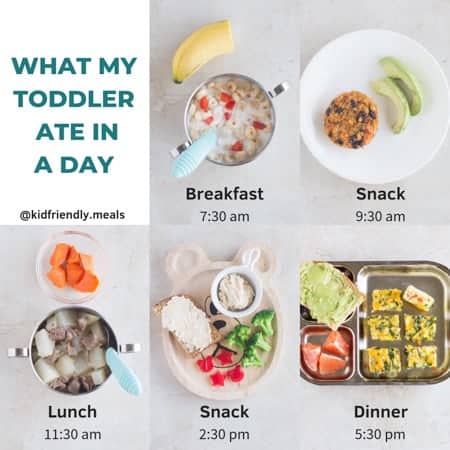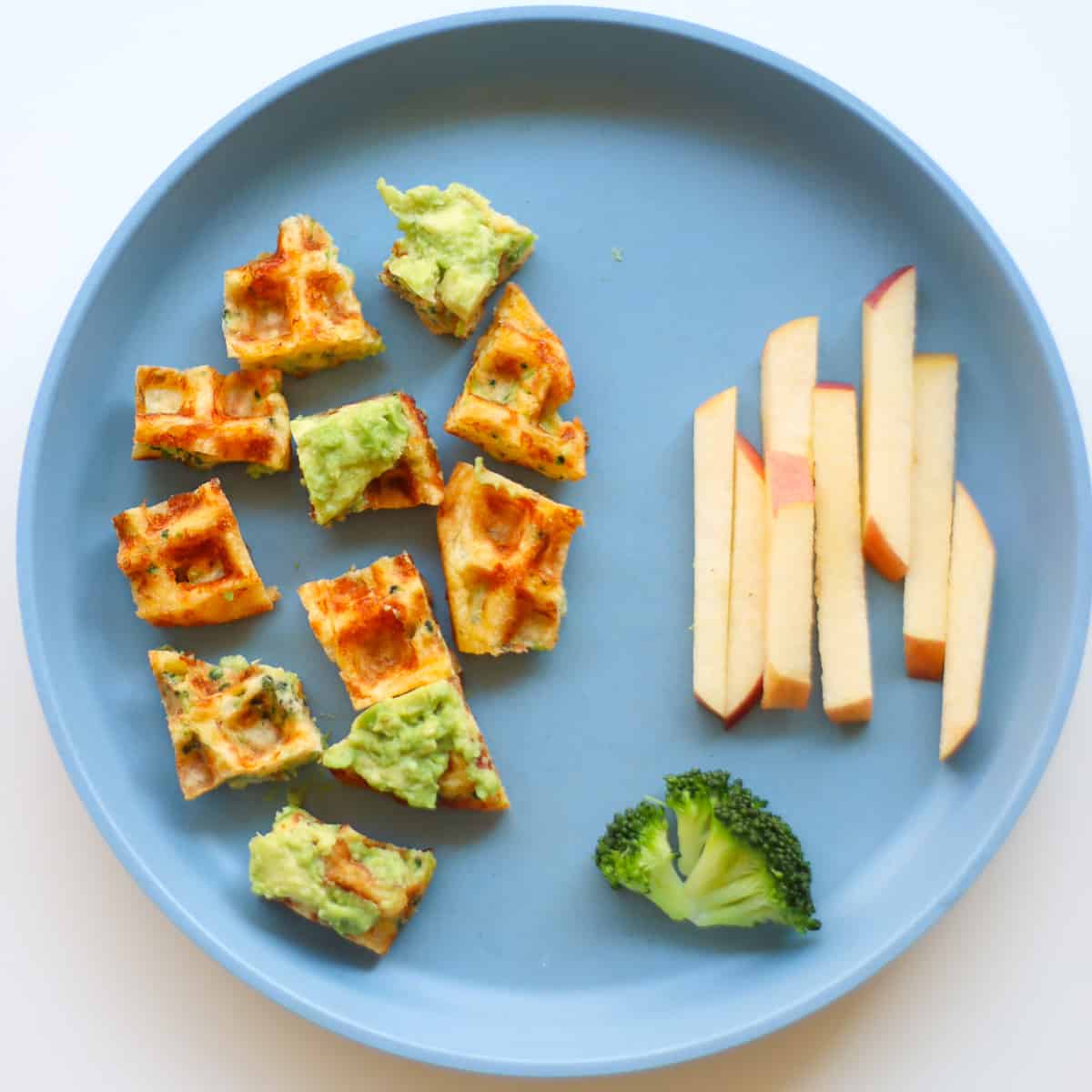But before jumping to conclusions about picky eating, let’s dive into some reasons why your little one might be saying no to food, and how you can turn these situations into opportunities to instill healthy eating habits.
Top reasons why your toddler won’t eat
When your child refuses to eat, it’s natural to feel a whirlwind of emotions: frustration, anxiety, worry, confusion, and even helplessness. In those moments, it’s easy to start blaming yourself. But please please hear me when I (a pediatric registered dietitian) say, your toddler not eating is not always because of the food. Your toddler may refuse to eat for a lot of different reasons. Let’s dive into them right now and learn what you can do to help your child to become mindful, joyous eaters.
1. Toddler Not Eating Because Their Growth Slows Down A Lot
To put into perspective, during the first year, babies triple their birth weights. During toddlerhood, average weight gain is around 4.5- 6.5 pounds and 2.5-3.5 inches per year. So it’s not as exponential but it is steady.
What To do:
Don’t take it personally. It’s discouraging to see food that you put so much thought and effort into getting pushed away, but you have to honor their innate ability to self-regulate. And please don’t worry! Say what? I know. It’s so hard. We so much want them to be well-fed and the idea of letting them go for several hours without eating doesn’t sit well with us, protective mamas! But hear me out. I can’t emphasize this enough. They should be allowed to respond to their own hunger cues. Believe it or not, they are REALLY good at responding to their feelings of hunger and fullness, and eating as much as they need for growth and energy. Just imagine how you would feel if someone forces you to eat when you have absolutely no appetite. I don’t know about you but know I’d get so irritated! Stay relaxed. Stay consistent with your mealtime structure and use responsive feeding practices.
2. Toddler Won’t Eat Because They Love to Test Boundaries
Once upon a time, you had a baby who was super happy and eager to follow your lead. Now you have a toddler who thrives on testing boundaries, wants to do everything their way, all the while screaming NO to everything. So of course, saying no to eating is bound to happen. It’s a NORMAL part of development.
What to do:
So if they decide to skip a meal, then you gently remind them that the kitchen will be closed until the next snack/mealtime. This is difficult for us as parents who were raised to clean our plates and not waste food. However, consider this as a great learning opportunity. They need to learn the consequences of choosing not to eat. They need to learn what it feels like to be hungry. We need to trust and honor their choices. If they start misbehaving at the table, you can give a gentle warning that the meal will end soon if they continue. You can be positive, yet firm and caring.
3. Toddler Not Eating Because They are Snacking ALL Day Long
It becomes a cyclical challenge: kids refuse their meals, parents resort to offering snacks, but this leads to constant grazing throughout the day, ultimately resulting in a disinterest in proper meals.
What to Do:
Establish a mealtime schedule!! It is incredibly helpful because it provides structure and consistency for both parents and children. Having set meal times helps regulate appetite, ensuring that children are hungry and ready to eat when food is served. It also fosters healthy eating habits by teaching kids to recognize hunger cues and understand the importance of regular meals. And if your toddler loves to snack all day long, here are some specific tips on how to take control of snack times.
4. Toddler Refuses to Eat Because They want Their Favorite Food
It could be that your child has gotten used to getting their favorite foods whenever they refuse a meal, which might have inadvertently turned you into a short-order cook. As a result, they might be less willing to try new foods, making it increasingly difficult to introduce variety into their diet.
What to do:
While you can’t get your child to eat (that’s not your job!), you can set boundaries and structure. I know. The temptation to say YES is so strong bc let’s face it! We just want our kids to be happy! Catering may seem effective in the moment. Your child gets fed and meltdowns are avoided. However, think about the long-term consequences. By doing so, you end up encouraging picky eating and your child’s health suffers. It may even hurt the mother/father-child relationship in the long run. Remember, you can love your child and say NO to their food requests. What I highly encourage you to do at every mealtime is serve foods that they enjoy with new ordisliked food. That way, even if your child eats just the food(s) they love, they’re still getting some sort of nutrition AND exposure to the food they haven’t quite opened up to, YET.
5. Your Toddler Won’t Eat Because They Feel Anxious Around New Foods
There’s actually a term for this – food neophobia. All of us experience this to some extent but it really peaks between 2-6 years. This is actually a protective mechanism (just like gagging in babies when they first start solids) to prevent children from consuming toxic or unsafe foods.
What to do:
While food neophobia is innate, this behavior can be overcome through repeated exposure to new foods! So the best thing you can do to encourage your child to give the “scary” food a try is, as mentioned above, to always offer a favorite food along with the food they’re learning to like. This will help make them feel more safe and more inclined to try something new. And keep offering the learning-to-like food regardless of whether or not the food gets eaten. Even just one piece (e.g. like the broccoli in the above image) can have a huge impact! Every time your child sees the food, it takes the newness out, which leads to familiarity, which leads to acceptance. Repeated exposure to foods for babies and toddlers is EVERYTHING!
6. Your Toddler Is Not Eating Because of Big Emotions
Physically, when the body is under stress, it shifts into the fight or flight mode, producing hormones that shut down appetite. And then there’s the emotional and mental component. Your toddler may turn to various coping strategies to help minimize anxiety, such as whining or crying, refusing to eat, acting out at the table, unable to sit still, etc.
What to do:
Keep your emotions in check. Make sure you don’t come to the table feeling anxious or displaying any negative energy. Don’t pressure, or force, your child to eat in any way. Perhaps you find yourself saying, “just another bite, eat that, finish that.” Or you’re watching their every move like a hawk, pushing the food closer, trying to spoon-feed. These are all forms of pressure. Instead, fall back on the Division of Responsibility. You, as the parent, are in charge of what, when, and where. Your child is responsible for how much and whether or not they will eat. That means once the food is on the table, you’ve done your part. It’s time to sit back and let your child take the reins. And try to take the focus away from the food. Don’t talk about what’s being eaten and what’s not. Instead, focus on enjoying the time together at the table. That’s when the magic happens!
7. Toddler Won’t Eat because They’re Sick
When a toddler is not feeling well or is sick, it can significantly impact their appetite. Just like adults, children may lose their appetite when they’re unwell. Additionally, their body may prioritize fighting off the illness over digestion, leading to a decreased desire to eat.
What to do
During these times, it’s essential to focus on providing comfort and hydration to your child. Offer small, frequent meals that are easy on the stomach. Fluids are most important. If your child is experiencing digestive issues, perhaps extra fiber or probiotics may help. If your child’s illness persists or if you’re concerned about their health or hydration levels, it’s crucial to consult with a healthcare professional for further guidance and treatment options.
8. Your Toddler is Too Tired to Eat
When toddlers are super tired, it’s like their appetite takes a nap too! They might feel too exhausted to eat or get a bit fussy and impatient during meals. And being worn out can mess with their hunger cues, so they might not even realize they’re hungry.
What to do:
It’s essential to prioritize adequate rest and sleep for your toddler. Establishing a consistent sleep schedule and ensuring they get enough rest during the day can help prevent fatigue-related eating challenges. Additionally, I want to emphasize again the importance of sticking to your mealtime structure. Offering meals and snacks at regular intervals, even if they’re smaller or more frequent than usual, can help maintain their energy levels and prevent excessive tiredness during meal times. When toddlers are particularly tired, it often hits hardest at dinner time. Here’s what to do if your toddler is constantly refusing to eat their dinner.
To Sum, Here’s What to Do when your 2 or 3 year old won’t eat!
If your child eats very little or skips a meal all together for whatever reason, that’s ok! This is when having structured meals and snack times come into play. Stay consistent. Your child will find it reassuring to know when to expect the next one. It will also be a great learning experience to know what it feels like to be hungry. Simply offer food again at the next meal or snack time. You don’t need to “make up” for the skipped meal with extra food later. Follow your child’s lead. And remember to consider their eating habits on a weekly and monthly basis rather than daily. It will all even out. As long as your child is growing along their growth curve and has normal energy level, you don’t need to worry!




